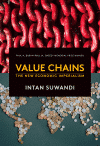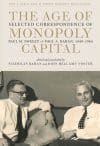Monopoly

The increasing consolidation of the modern entertainment industry by a small clique of multinational streaming giants is the next step in the “standardization of style” in mass-consumed art. The work of Pier Paolo Pasolini can help remind us of what we’re missing. | more…

Financialized Capitalism, COVID-19, and the Great Divide
Although the current crisis of production associated with the COVID-19 pandemic has sharpened disparities, the overall problem is much longer and more deep-seated, a manifestation of the inner contradictions of monopoly-finance capital. Comprehending the basic parameters of today’s financialized capitalist system is the key to understanding the contemporary contagion of capital, a corrupting and corrosive cash nexus that is spreading to all corners of the U.S. economy, the globe, and every aspect of human existence. | more…

An interview with Henryk Szlajfer by Grzegorz Konat. Szlajfer was a leading figure in the student uprisings in Poland in March 1968. He was expelled from the University of Warsaw and was arrested and imprisoned for political dissent. He later conducted research in political economy focusing on the theory of monopoly capitalism, where he made major contributions, and coedited The Faltering Economy with John Bellamy Foster. | more…

Winner of the 2018 Paul M. Sweezy – Paul A. Baran Memorial Award for original work regarding the political economy of imperialism, Intan Suwandi’s Value Chains examines the exploitation of labor in the Global South. Focusing on the issue of labor within global value chains—vast networks of people, tools, and activities needed to deliver goods and services to the market and controlled by multinationals—Suwandi offers a deft empirical analysis of unit labor costs that is closely related to Marx’s own theory of exploitation. | more…

Unlike such obvious forms of oppression as feudalism or slavery, capitalism has been able to survive through its genius for disguising corporate profit imperatives as opportunities for individual human equality and advancement. But it was the genius of Karl Marx, in his masterwork, Capital, to discover the converse law of surplus value: behind the illusion of the democratic, supply-and-demand marketplace, lies the workplace, where people trying to earn a living are required to work way beyond the time it takes to pay their wages. Leave it to the genius of Samir Amin to advance Marx’s theories—adding to them the work of radical economists such as Michal Kalecki, Josef Steindl, Paul Baran, and Paul Sweezy—to show how Marxian theory can be adapted to modern economic conditions. | more…

Paul A. Baran and Paul M. Sweezy were two of the leading Marxist economists of the twentieth century. Their seminal work, Monopoly Capital: An Essay on the American Economic and Social Order, published in 1966, two years after Baran’s death, was in many respects the culmination of fifteen years of correspondence between the two, from 1949 to 1964. During those years, Baran, a professor of economics at Stanford, and Sweezy, a former professor of economics at Harvard, then co-editing Monthly Review in New York City, were separated by three thousand miles. Their intellectual collaboration required that they write letters to one another frequently and, in the years closer to 1964, almost daily. Their surviving correspondence consists of some one thousand letters. | more…
A half-century after its publication, Paul Baran and Paul Sweezy’s Monopoly Capital remains the single most influential work in Marxian political economy to emerge in the United States.… In recent years, interest in Baran and Sweezy’s magnum opus has revived, primarily for two reasons: (1) the global resurgence of debates over the constellation of issues that their work addressed—including economic stagnation, monopoly, inequality, militarism and imperialism, multinational corporations, economic waste, surplus capital absorption, financial speculation, and plutocracy; and (2) the new, fundamental insights into the book’s origins resulting from the publication of its two missing chapters and the public release of Baran and Sweezy’s correspondence.… I shall divide this introduction on the influence and development of the argument of Monopoly Capital over the last fifty years into three parts: (1) a brief treatment of the book itself and its historical context; (2) a discussion of responses to Monopoly Capital, and of the development of the tradition that it represented, during its first four decades, up to the Great Financial Crisis that began in 2007; and (3) an assessment of the continuing significance of monopoly capital theory in the context of the historical period stretching from the Great Financial Crisis to the present. | more…
The central problem in advanced monopoly capitalism is not one of scarce resources clashing against innate, insatiable wants. Rather, it is one of an abundance of production clashing against saturated consumption and investment markets. In order to absorb potential economic output and forestall excess capacity, business interests must continuously search for new markets to exploit or entice existing customers who stand ready to buy the latest product, iteration, or service, and to induce new investment. The key to business survival in a capitalist economy is continual expansion of market share and reach: grow or die.… The efforts applied to this relentless drive undermine the conventional wisdom of market-determined pricing—for were a competitive price system in place, the funds for these expenditures would not exist. As I will show, the resources and funds expended in this quixotic endeavor to grow can be broadly referred to as the “economic surplus.” | more…
From the 1960s to the Present
In 1964, Paul Baran and Paul Sweezy wrote an essay entitled “Notes on the Theory of Imperialism” for a festschrift in honor of the sixty-fifth birthday of the great Polish Marxist economist Michał Kalecki.… [T]he essay offered the first major analysis of multinational corporations within Marxian theory. Parts of it were incorporated into Baran and Sweezy’s Monopoly Capital in 1966, two years after Baran’s death. Yet for all that book’s depth, “Notes on the Theory of Imperialism” provided a more complete view of their argument on the growth of multinationals. In October and November 1969, Harry Magdoff and Sweezy wrote their article “Notes on the Multinational Corporation,” picking up where Baran and Sweezy had left off. That same year, Magdoff published his landmark The Age of Imperialism, which systematically extended the analysis of the U.S. economy into the international domain.… In the analyses of Baran, Sweezy, and Magdoff, as distinct from the dominant liberal perspective, the multinational corporation was the product of the very same process of concentration and centralization of capital that had created monopoly capital itself. | more…
Three years ago, in December 2006, I wrote an article for Monthly Review entitled “Monopoly-Finance Capital.” The occasion was the anniversary of Paul Baran and Paul Sweezy’s Monopoly Capital, published four decades earlier in 1966.…The article…[discussed] “the dual reality” of stagnant growth (or stagnation) and financialization, characterizing the advanced economies in this phase of capitalism. I concluded that this pointed to two possibilities: (1) a major financial and economic crisis in the form of “global debt meltdown and debt-deflation,” and (2) a prolongation of the symbiotic stagnation-financialization relationship of monopoly-finance capital. In fact, what we have experienced in the last two years, I would argue, is each of these sequentially: the worst financial-economic crisis since the 1930s, and then the system endeavoring to right itself by returning to financialization as its normal means of countering stagnation. It is thus doubly clear today that we are in a new phase of capitalism. In what follows, I shall attempt to outline the logic of this argument, as it evolved out of the work of Baran, Sweezy, and Harry Magdoff in particular, and how it relates to our present economic and social predicament. | more…
The year now ending marks the fortieth anniversary of Paul Baran and Paul Sweezy’s classic work, Monopoly Capital: An Essay on the American Economic and Social Order (Monthly Review Press, 1966). Compared to mainstream economic works of the early to mid-1960s (the most popular and influential of which were John Kenneth Galbraith’s New Industrial State and Milton Friedman’s Capitalism and Freedom), Monopoly Capital stood out not simply in its radicalism but also in its historical specificity. What Baran and Sweezy sought to explain was not capitalism as such, the fundamental account of which was to be found in Marx’s Capital, but rather a particular stage of capitalist development. Their stated goal was nothing less than to provide a brief “essay-sketch” of the monopoly stage of capitalism by examining the interaction of its basic economic tendencies, narrowly conceived, with the historical, political, and social forces that helped to shape and support them | more…





